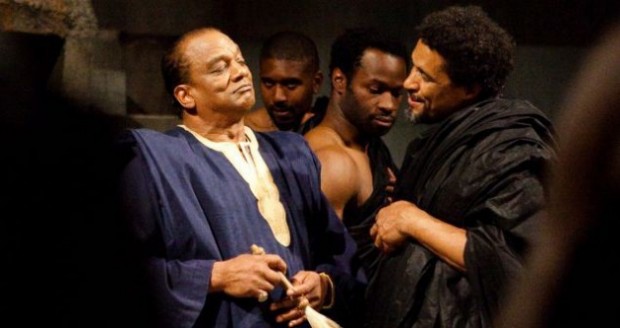Does Shakespeare’s Julius Caesar really have anything to tell us about African politics? Apparently, it does. The Royal Shakespeare Company recently concluded its New York run of an African adaptation of Julius Caesar. It is set in present-day Africa and tries to capture the dark days of military dictatorship. Beginning in the sixties, African politics lost the visionary spirit of the pre-independent years. Country after country fell into oppressive rule under a revolutionary leader turned tyrant. Even my Nigeria had more than its fair share of military dictatorship, which came to an end in the late nineties with the death of the psychopath president, General Sani Abacha. I certainly agree with Gregory Dolan, who directed the play, that Shakespeare’s 400-year old play about a beloved leader turned tyrant resonates with Africa. Dolan is essentially asking us to imagine a super-long history of tyranny that begins with Caesar and ends with Mobutu, Gaddafi, Amin, Abacha (take your pick). Brilliant.
Shakespeare and Africa have actually had a longstanding love affair. His plays are a mainstay of a certain kind of African liberal education. What is news to me is the Mandela-Shakespeare connection. Apparently, a copy of Shakespeare’s complete works was smuggled by a prisoner into Robben Island where Mandela was held up. The copy circulated among several inmates who would read it, underlined favorite passages, and left marginal comments. Guess what passage Mandela underlined. It’s the famous passage in Act II, scene II:
Cowards die many times before their deaths;
The valiant never taste of death but once.
Of all the wonders that I yet have heard.
It seems to me most strange that men should fear;
Seeing that death, a necessary end,
Will come when it will come.
Wondering what changes were made to the original? If you have read the play, you’d recall that there is a soothsayer. In this adaptation, he is portrayed as a witch doctor, an oracular figure that is common to many different African cultures. The poet Cinna is wrongfully thought to be a conspirator and lynched with the infamous “necklace of fire” (a tire set ablaze), a device that is sadly commonly used in cases of mob lynching in African cities. Also imagine seeing Marc Antony and Octavius Caesar in military uniforms.
It is worth asking what Shakespeare would have thought of this adaptation. I always like the iconoclasm of putting works to uses that their authors would not have imagined. The success of this adaptation speaks to the strength of Shakespeare’s work as a true classic. Great stories travel well. But the good thing with a project like this is that it changes all the parties involved. An African adaptation of a Shakespeare play changes the play, makes us look at it differently, as much as the play opens up something new about the African world.
Here is Teju Cole’s review of the performance at BAM for the New Yorker.









COMMENTS -
Reader Interactions